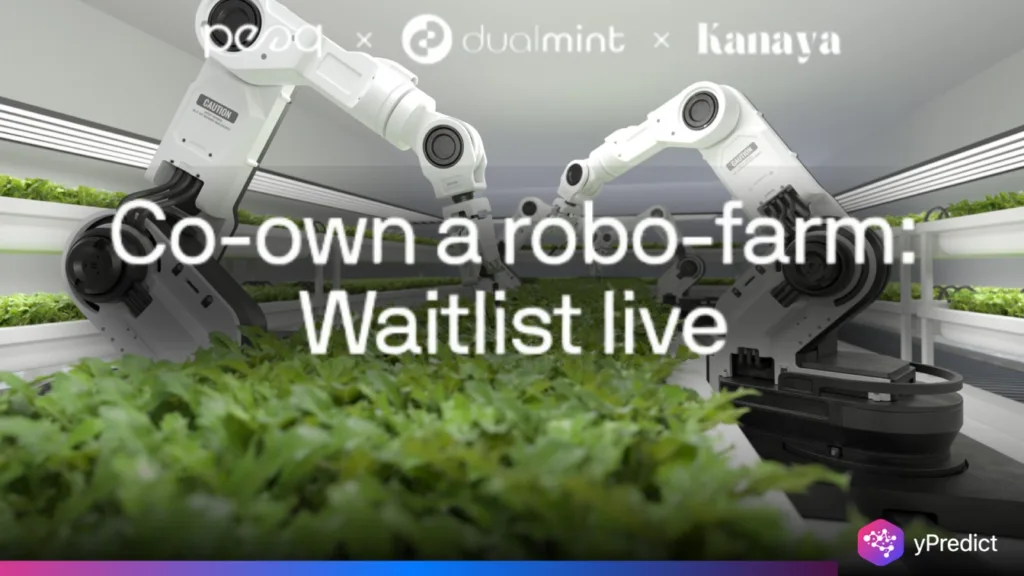
The world’s first tokenised robo-farm is now up and running on the Peaq blockchain. It is a ‘world-first’ for both agriculture and blockchain technology. This pioneering effort merges cutting-edge AI-based automation with the principles of decentralised finance (DeFi). It offers token holders a portion of actual farm profits. This is a project between Kanaya AI and DualMint RWA, in partnership with Peaq. It brings together AI and blockchain to feed the world with sustainable food production.
Kanaya AI: Pioneering Smart Farming Automation
The platform, Kanaya AI, is a leader in AI-powered farm optimisation. It has created a system that automates 80% of farming operations. Using state-of-the-art robotics and machine learning algorithms, Kanaya AI technology supervises key agricultural activities. Such as planting, watering and reaping. While requiring only a small amount of human intervention. This automation streamlines the way of life while cutting down on the labour force and resources for farming. This, in turn, makes it more sustainable and scalable. The adoption of Kanaya AI’s products in the Peaq ecosystem is a major step forward when it comes to the application of AI in agriculture.
DualMintRWA: Enabling Tokenisation of Real-World Assets
DualMintRWA is a real-world asset tokenisation platform. In this case, it converts the farm’s operational proceeds into digital tokens. Investors can freely trade these tokens, which run on the Peaq blockchain and give them a share of farm revenue. The tokenisation procedure offers a clear and safe way of sharing profits. This makes earnings tightly bound to farm performance, not traditional crypto’s fluctuation. This mechanism democratises to a certain extent the commodity plays. It also allows more people access to agricultural investments.
Peaq Blockchain: Infrastructure for the Machine Economy
Peaq is the underlying blockchain infrastructure behind this ground-breaking initiative. Built to accommodate the Machine Economy, Peaq enables AI-networked devices. As well as physical assets to be “plugged” into a decentralised network. It offers a place where machines can independently communicate, do business and exchange data. Thus, Peaq makes it possible to create dApps that run effectively and safely on the network. The Robo-farm is tokenised on the Peaq system using its transparent governance and secure transactions. And also a fully automated profit distribution among token holders.
Sustainable and Profitable Farming Model
The tokenised Robo-Farm specialises in growing high-demand vegetables such as lettuce, kale and spinach. The produce is grown automatically with AI-powered automation. This is to achieve better growing conditions and resource consumption. The farm is a CSA (community supported agriculture) distribution operation. It supplies produce directly to customers on a subscription basis. Not only is this a provision of a steady income. Reducing food miles and supporting local economies also encourages sustainability.
Investors of the farm token will receive up to 20% APY. The farm’s efficient production and profitability directly drive this yield. This offers the link a stable and predictable income. Unlike typical cryptocurrency investments, the return is delivered through real-life agricultural produce. This provides investors with a haven against market volatility.
Bottom Line: Shaping the Future of AI and Agriculture
The introduction of a tokenised robo-farm on the Peaq blockchain is a major step for the integration of AI, blockchain technology and agriculture. It utilises smart farming automation by Kanaya AI, with the tokenisation platform of DualMintRWA and the blockchain infrastructure from Peaq. This project thus becomes a model for future decentralised solutions involving agriculture that are led by AI. It introduces a new way for investors to engage in sustainably produced foods that is both transparent and profitable. As the project grows, it stands to transform our agricultural ecosystem. And also makes it more efficient, available and in line with machine economy principles.






